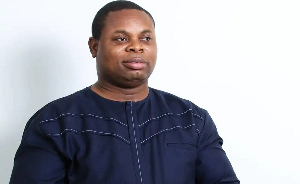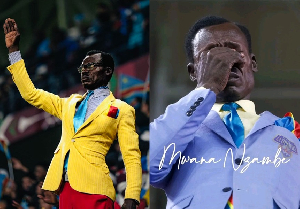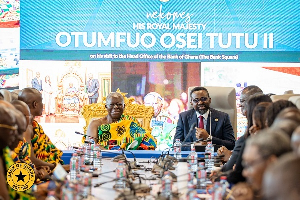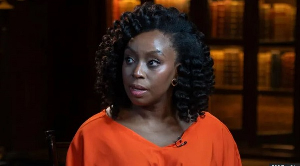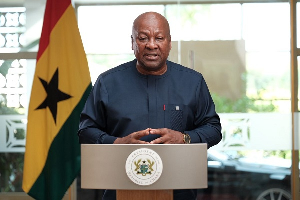By Kwame Okoampa-Ahoofe, Jr., Ph.D.
He did not use exactly the words quoted in the caption to this article, but that was unmistakably what the Supreme Commander of the 31st December Trokosi Revolution meant, when Chairman Jerry John Rawlings solemnly and emotionally observed the fact of the late Prof. Kofi Nyidevu Awoonor's having played a "selfless and vital role" in the criminally undemocratic putsch that ousted the government of the popularly elected President Hilla Babini Limann and the People's National Party (PNP) - (See "Rawlings: Awoonor Played Vital Role in 31st December Revolution" JoyOnline.com/Ghanaweb.com 9/27/13).
It is significant to recall that during the 1970s, under the Acheampong junta, Prof. Awoonor mounted a protest-rally platform and vehemently denounced the "undemocratic" Supreme Military Council (SMC I) junta. He would also call for an end to all non-elective forms of government. Awoonor would also vehemently deny any involvement in a foiled coup attempt allegedly led by one Brig. Kattah (or some such name). He would spend nearly a year in prison and pen and publish a collection of poetry titled The House By The Sea.
The latter volume has been variously described as the "classic Trokosi equivalent of Wole Soyinka's [sui generis] prison notes, The Man Died." But, of course, those of us who have studied and produced our own literary works know perfectly well that Awoonor's The House By The Sea is absolutely no qualitative match for Soyinka's The Man Died in terms of linguistic richness, mellifluity and intellectual thrust, depth and erudition. This, of course, is no accident. The Trokosi Nationalist hypocrite and an apparently congenital liar would shortly truck with both the Rawlings-led Trokosi "revolutions" of June 4, 1979 and December 31, 1981. It was obviously in allusion to this fact that Mr. Rawlings made the following observations in a book of condolences marking violent passing of Prof. Awoonor in the well-trained crosshairs of the Somali-based Islamist militant organization, Al-Shabab.
According to Chairman Rawlings, "On [sic] the onset of the 31st December 1981 revolution when integrity was very high you [i.e. Awoonor] were one of the bold and leading advocates of the PNDC principles and we thank you for it." Actually, Awoonor completely lost whatever vestige of integrity he might have been left with, when he knavishly decided to go to bat for his tribesman by assuming the undignified role of PNDC political theorist and unabashed and unconscionable tribal propagandist. It is also clear that Mr. Rawlings does not know what he is talking about, when the Sogakope Mafia Kingpin gushes about "integrity" having been "very high" in the wake of the 31st December Trokosi Revolution.
In the preceding, Mr. Rawlings clearly appears to be confusing "morale" with "integrity." And, needless to say, if, indeed, the former behavioral element seemed to have literally shot through the roof, as it were, in the wake of the ideologically camouflaged Trokosi Revolution, this was primarily because of the massive wave of general discontent for military rule, regardless of the ethnicity or backgrounds of the key players involved.
And just precisely what were the principles behind the Rawlings-led so-called Provisional National Defense Council (PNDC)? It was simply the primitive imposition of Ewe hegemony on the Akan ethnic majority populace of Ghana, even as Awoonor quite eloquently and venomously expatiated in his Trokosi supremacist treatise titled The Ghana Revolution. We shall in due course comprehensively examine the latter document, which one well-known Ghanaian journalist at the time of its publication sarcastically described The Ghana Revolution as "a very good exercise in tribalism," to which Awoonor, predictably, riposted with a nonchalant rhetorical shoulder shrug.
If the Al-Shabab baptism of fire has any lessons for Ghanaians, it is simply that one cannot poison the communal well, or stream, without the culprit in turn drinking himself to death in the process. This, in effect, for me, is what may be aptly envisaged to constitute the bizarrely unique legacy of Prof. Awoonor to postcolonial Ghanaian political culture. It was this unhealthy trend of Ewe siege mentality, whose apparently round rejection by the present generation of National Democratic Congress stalwarts, Chairman Rawlings bitterly lamented, when he observed in Awoonor's book of condolences that whatever remains of his so-called PNDC principles have been "shoved under the carpet by some leaders of [the so-called] National Democratic Congress."
__________________________________________________________
*Kwame Okoampa-Ahoofe, Jr., Ph.D.
Department of English
Nassau Community College of SUNY
Garden City, New York
Sept. 27, 2013
E-mail: okoampaahoofe@optimum.net
###
Opinions of Friday, 4 October 2013
Columnist: Okoampa-Ahoofe, Kwame


